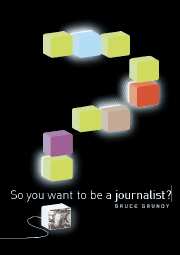Book contents
- Frontmatter
- Contents
- Acknowledgments
- Introduction
- Part 1 Getting started in journalism
- Part 2 Writing skills
- 5 Grammar
- 6 Spelling and punctuation
- 7 Subbing
- 8 Basic newspaper layout and design
- Part 3 Understanding the law
- Part 4 Research skills
- Part 5 Being professional in journalism
- Bibliography
- Further reading
- Index
5 - Grammar
Published online by Cambridge University Press: 05 June 2012
- Frontmatter
- Contents
- Acknowledgments
- Introduction
- Part 1 Getting started in journalism
- Part 2 Writing skills
- 5 Grammar
- 6 Spelling and punctuation
- 7 Subbing
- 8 Basic newspaper layout and design
- Part 3 Understanding the law
- Part 4 Research skills
- Part 5 Being professional in journalism
- Bibliography
- Further reading
- Index
Summary
Any attempt to raise the issue of problems surrounding grammar, spelling and punctuation usually causes students' eyes to glaze over. They are topics that are seen to be either boring or no longer important in today's world. Or, it is claimed, “everyone knows that stuff”. The truth is, not only are they interesting, they are also important, and not “everyone knows that stuff” at all. There are examples of poor grammar and incorrect spelling and punctuation appearing in the news media every day and these are matters that are central to the issue of a journalist's credibility.
If you cannot spell, punctuate and use grammar correctly, those who can will laugh at you – and your publication. They will cut out your gaffes from the paper and email them to their friends with rude comments and ridicule you in the pub. Examples abound. The past tense of the verb “to sneak” is “sneaked”, not “snuck”. A person sentenced to capital punishment is “hanged” not “hung”. Never, in the entire history of our legal system, has anyone “pled” his or her innocence; there is no such word. Indeed, if you do not know the difference between a gerund or verbal noun and a present participle and which requires a personal and which a possessive pronoun, what you write will either mean something other than what you meant to write, or it will cause your readers to sneer. Or both.
- Type
- Chapter
- Information
- So You Want To Be A Journalist? , pp. 127 - 154Publisher: Cambridge University PressPrint publication year: 2007



